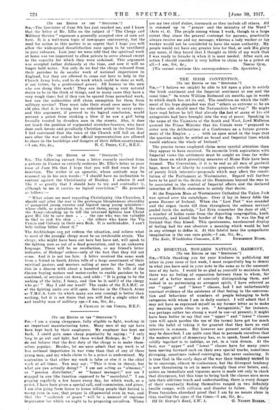AN ESSENTIAL TOWARDS NATIONAL HARMONY. [To THE EDITOR Or THE
" SPECTATOR."] Soo—While thanking you for your kindness in publishing my letter in your issue of last week, I must respectfully beg to demur to what you have said in your note to the same as to the unsound- ness of my facts. I would be as glad as yourself to maintain that there was no feeling of separation between those to whom, for want of a better means of concisely distinguishing them, and indeed in no patronizing or arrogant spirit, I have referred a,s our " upper " and " lower " classes, had I not unfortunately constant evidence of the existence of that feeling in the conversa- tion and behaviour of numbers of people belonging to both categories with whom I am in daily contact. I will admit that I may not have so expressed myself in my former letter as to make my meaning quite clear to you. " Antagonistic," for instance, was perhaps rather too strong a word to use—at present; it might have been better to say that our " upper " and "lower " classes (you will again pardon the use of the terms) have got too much into the habit of taking it for granted that they have no real interests in common. But however our present social situation may be described, I am quite sure that to persuade ourselves that the modern spirit of democracy has, so to speak, fused all classes solidly together* is to indulge, as yet, in a vain dream. At the best, our " upper " and "lower " classes have for many years been moving forward each on their own special tracks, sometimes diverging, sometimes indeed converging, but never coalescing. It is true that in the early days of the war their tendency seemed to be to converge, almost to coalescence, but the divergent tendency is now threatening to set in more strongly than ever before, and, unless an immediate and vigorous move is made not only to check that divergence, but this time to bring back the classes once more into their old-time touch and understanding, there is every danger of their eventually finding themselves ranged in two definitely hostile camps, with collision and disaster to follow. Our daily Press furnishes abundant proof that I am by no means alone in thus reading the signs of the times.--I am, Sir, Ire.,


































 Previous page
Previous page